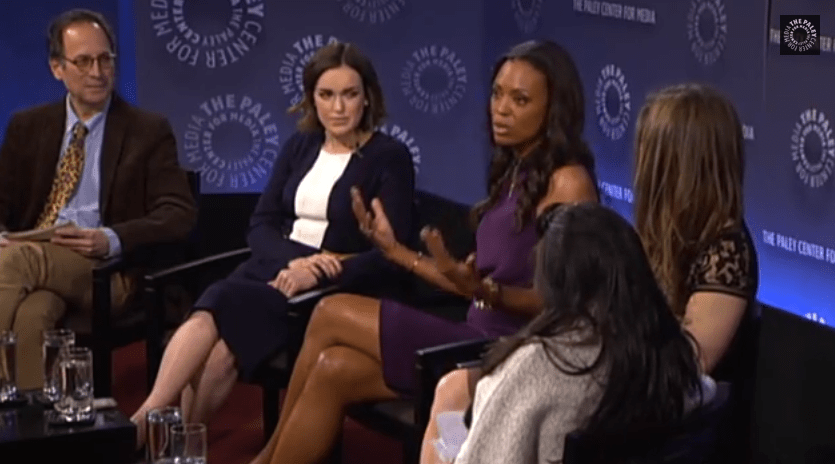Paley Center “Cracking the Code” Panel Discusses Television’s Portrayal of Women in STEM

A recent Girls Who Code collaboration with CoverGirl, which Reshma Saujani screened at the panel on Monday. Some of the girls in the commercial were in attendance that night.
But most of the panelists did agree that the culture was changing for the better—in particular through the way strong, scientific, technologically competent women are depicted in science fiction, fantasy, and genre , which often takes on a more aspirational. In particular Saujani praised Dr. Jemma Simmons from Agents of SHIELD, as played by panelist Elizabeth Henstridge, saying that many of the applicants for Girls Who Code programs want to be her.
As Henstridge told us on the red carpet before the panel began, she was originally attracted to Simmons’ strength and intelligence, not thinking that she would be a role model or young girls interested in science. Now, though, she certainly understands why so many of them can relate to her:
TV is a very intimate relationship. You’re inviting these characters into your home and in that way they do become an extension of your family, for better or worse. If someone who isn’t surrounded by women who potentially work in fields they might have some seeds of interest in, to see that on TV and understand characters within that world, I think, does spark something inside young minds. And that’s not to say that all sorts of worlds can’t be depicted, but I think when young girls have good role models, it makes a difference.
“I think that our show is very lucky that we’re in a fantasy world and we can raise a lot of issues in a metaphorical way without it being too didactic,” she also added later. “But I also think it’s important that we show reality of situations, like in Silicon Valley, that creates a conversation in itself even if it’s saying, ‘Hey, why is this happening?'”
Aisha Tyler also cited another superhero-friendly female character, Felicity Smoak from Arrow, saying that she’s has moved beyond her role as glorified tech support in season one (which media analyist David Bushman noted is a pretty pervasive trope, as outlined by a recent AV Club article) to become an integral member–and sometimes the most important member—of the team. “That is a show that young girls watch and that is a show that’s targeted at that age demo, and I think it is happening in these worlds where we’re talking about the way we want to see the world and not necessarily trying to do something that’s representative of the way the world may be right now,” she said.
Ultimately the biggest obstacle, most of the panel agreed, is convincing the gatekeepers of culture—the television producers, for example, and the people who are directly responsible for creating content—that there is a market for shows that empower women and girls in a particular way.
“Raising a discussion like this you realize how many young girls are out there and would tune in to a TV or would go to the movies and buy a ticket. I think that that’s the bottom line,” Henstridge noted. “I meet young girls all the time that tell me they’re really excited about going to physics or going to biology because of watching my character, and that’s very gratifying and it’s lovely to get that feedback. But I think you hold the power. These young girls hold a certain amount of power. It’s just about telling the guys at the top that “hey, they’re here.”
Tyler admitted, however, that there’s still one place she definitely wants to see television go that maybe young girls don’t. “Every super smart female IT person has an awesome tight dress and heels, and every brilliant guy hasn’t showered since 1979. So I would like to see more hot IT guys who look like models, and more schlubby women who look like I do when I get up in the morning. That’s what I would like.”
If you’re interested in hearing and seeing more from Monday’s panel, most of it is available on Youtube via the “Cracking the Code” event page. Thanks to the Paley Center for Media in New York for giving us the opportunity to attend the event, which we hope will inspire other similar panels and discussions in the future.
Are you following The Mary Sue on Twitter, Facebook, Tumblr, Pinterest, & Google +?
Pages: 1 2
Have a tip we should know? tips@themarysue.com